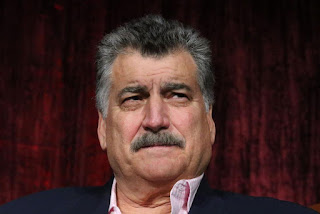6. Keith Hernandez
“Eat
your heart out, UPS and FedEx: when it comes to logistics and moving assets
around, Major League Baseball destroys you.” -Keith Hernandez
Keith Hernandez is, to
put it mildly, a little old school. Watch any Mets telecast and this becomes apparent
pretty quickly. The former first baseman turned television analyst has little
taste for the changes that have visited the contemporary game, huffing in
disgust at such recent innovations as the shift or instant replay. Sometimes,
this old school attitude extends to political and social commentary and the
results can get Hernandez in trouble. In 2006, he famously decried the presence
of a female massage therapist in the San Diego Padres dugout, leading to much
criticism and, later, an apology from Hernandez. In his new memoir I’m Keith
Hernandez, where he expounds at somewhat unsatisfying length on his
feelings about the incident (it all goes back to his self-consciousness about
boil scars on his butt), he describes himself as follows: “a member of an older
generation with somewhat conservative political and social views that aren’t
radical but perhaps not mainstream either.”
These views (in addition
to his occasional sexism, he says things like “the Spanish Empire was great”
and Carly Fiorina is “smart… Margaret Thatcheresque”), make it hard to embrace
Hernandez who seems to revel in his role as dinosaur. But those same dinosaur
attitudes that have no place in civilized discourse are, when applied to the currently
troubled sport he’s dedicated his life to, in many ways, quite necessary. And, further,
for all their surface level conservatism, his takes on 21st century
baseball, were he able to follow these lines of thought out into extra-athletic
territory, might lead to a far more enlightened world view than the one that we
know him to keep. (But this divide is hardly unique to Hernandez; many
ballplayers hold to staunchly right-wing politics, except when it comes to
strong support for the union that they happen to belong to.)
Hernandez begins chapter
11 of his book with a cheeky, intentionally exaggerated description of the fate
that might befall a struggling young minor league baseball player in today’s
game. Whereas when he was scuffling at Double A in 1973, his general manager
understood it was a question of confidence and, rather than demoting him, sent
him up the ranks to Triple A, today’s ballplayer would stand no chance. Subjected
to the management of a computer whiz kid who’s been put in charge of the front
office and relies entirely on algorithms rather than any innate understanding
of the game, the young player would be demoted, made to feel he’s living under
a microscope, panic, and eventually play himself out of a job. This is what
happens when athletes are seen simply as “assets” that exist to be constantly
“moved around” by management.
This management strategy
is just one of the problems with Baseball According to Keith. But it’s not just
Hernandez that sees problems. The sport is widely understood to be in crisis
mode, largely the product of a style of play—all strike outs and home runs—that
is not only deadly dull but makes the game take far longer to unfold than
anyone would like. Commissioner Rob Manfred’s solutions, such as instituting
pitch clocks, are rightfully ridiculed by Hernandez, who understands that the real
problem lies elsewhere.
But Hernandez saves his biggest
critique for the algorithmic systems that have come to dominate the management
of the game. (In this he’s not alone. Last year, former outfielder Jayson Werth
blasted the “super nerds” running baseball front offices, saying “it’s to the
point where you just put computers out there… just put them out there and let
them play.”) What Hernandez understands is that this drive towards a
dehumanizing efficiency is killing baseball. What he perhaps doesn’t
understand: that this drive towards a dehumanizing efficiency is killing the
world. It’s easy enough to see the sports world as self-contained, but what
happens in baseball doesn’t remain safely contained within its specialized
borders. Hernandez is a smart guy (or so everyone in the book keeps telling
him.) Surely he can see that the same instinct that compels baseball GMs to
reduce players to data sets fuels so much that goes on in the world beyond the
diamond, as exemplified by the massive control exerted on our access to
information by tech giants like Google and Amazon. If we follow the lessons we
learn from sports out into the wider world, we might be surprised at the
conclusions we reach. For the sometimes lovable curmudgeon known as Keith
Hernandez, it might just prove to be a revelation.



Comments
Post a Comment